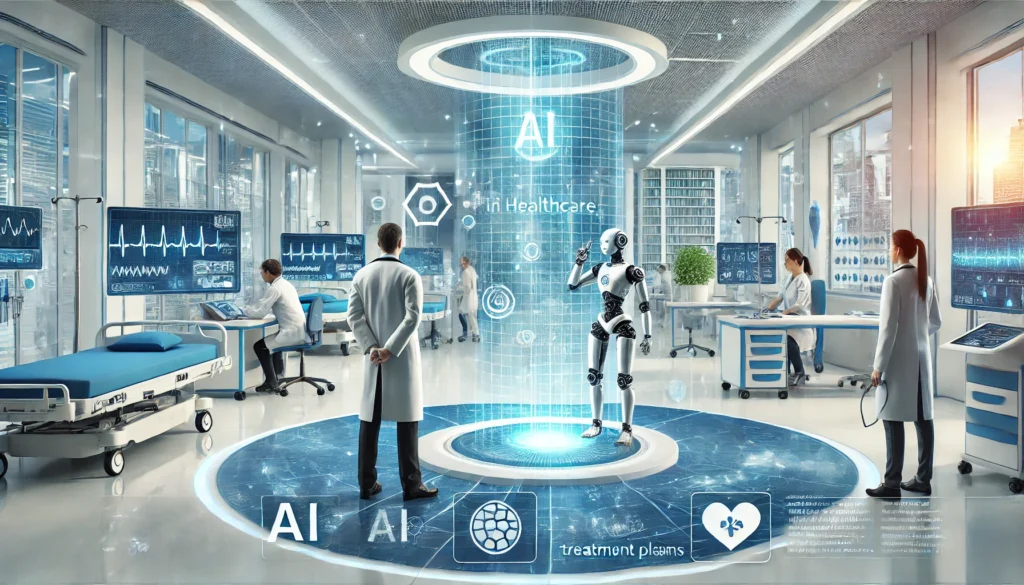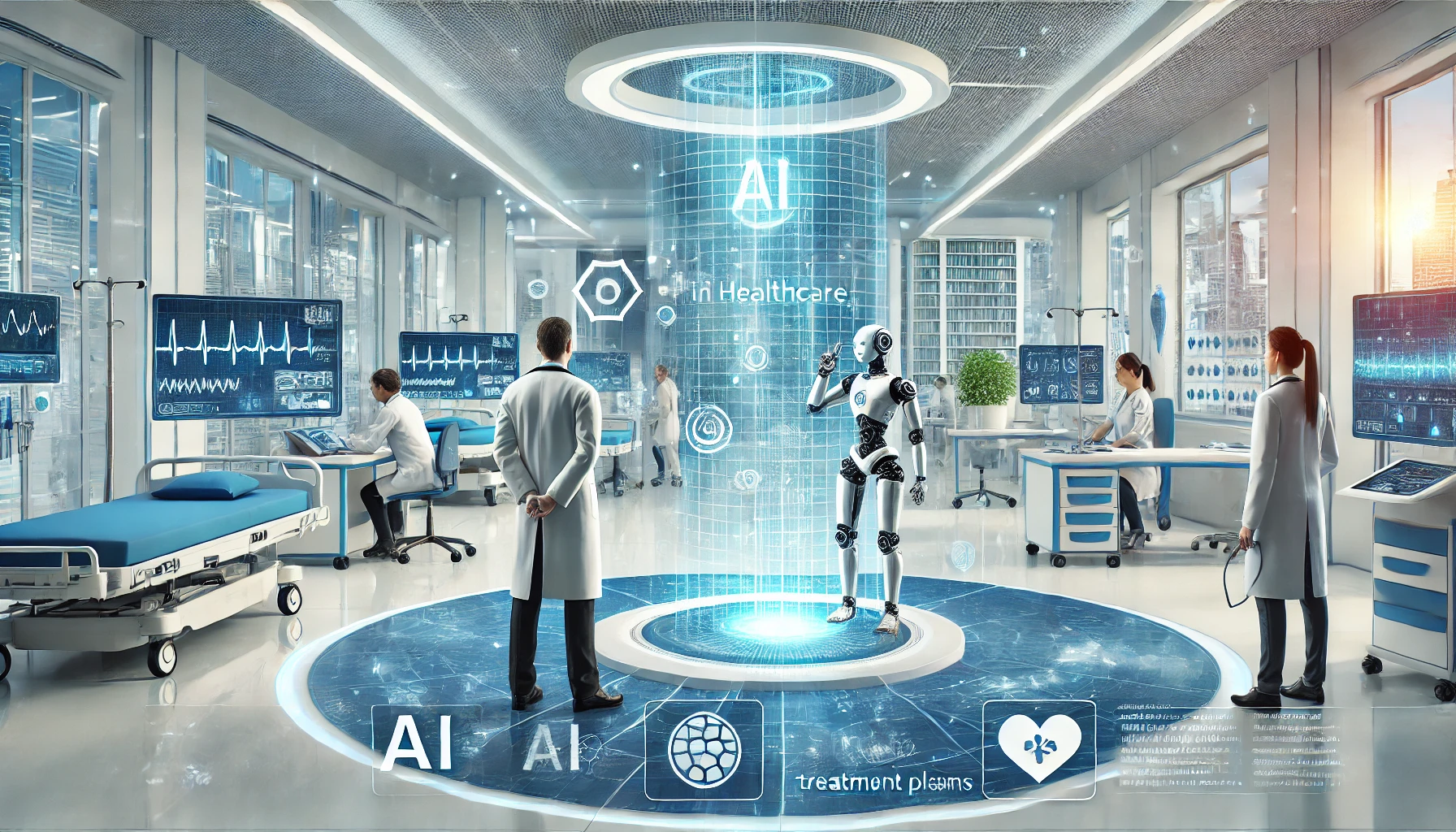
Artificial Intelligence (AI) is no longer a futuristic concept; it’s actively transforming various industries, and healthcare is at the forefront of this revolution. With the rise of AI-driven technologies, healthcare systems are becoming more efficient, predictive, and personalized. In 2024, AI is expected to reshape healthcare even further, bringing forth innovative applications and setting trends that will define the future of medicine. From diagnostics to patient care, AI’s impact on healthcare is profound.
In this blog, we’ll dive deep into how AI is revolutionizing healthcare, the key applications that are already making a difference, and the trends that will dominate the landscape in 2024.
The Role of AI in Healthcare
AI in healthcare leverages machine learning, deep learning, and data science to mimic human intelligence and automate complex tasks. This includes everything from medical imaging analysis to predictive analytics and treatment recommendations. AI systems can process large datasets at incredible speeds, often outperforming humans in diagnosing diseases, predicting patient outcomes, and personalizing treatment plans.
Key Applications of AI in Healthcare
AI in Medical Imaging and Diagnostics
One of the most significant breakthroughs in healthcare AI has been in the field of medical imaging and diagnostics. AI-powered systems, using deep learning algorithms, are now capable of analyzing medical images such as MRIs, CT scans, and X-rays with unprecedented accuracy.
Cancer Detection: AI models like those from Google Health have shown greater accuracy in detecting breast cancer than human radiologists.
Eye Diseases: DeepMind’s AI system can detect over 50 eye diseases from scans with the same accuracy as top doctors.
Cardiovascular Conditions: AI can predict cardiovascular issues from routine heart scans, allowing earlier intervention and treatment.
AI-driven diagnostics help reduce human errors, save time, and offer second opinions to medical professionals, improving the overall quality of healthcare.
Predictive Analytics in Patient Care
AI-driven predictive analytics play a pivotal role in personalized patient care. By analyzing patient data from electronic health records (EHRs), wearable devices, and genetic profiles, AI algorithms can predict the likelihood of diseases such as diabetes, cancer, and cardiovascular disorders.
Early Detection: AI models can detect early signs of diseases, even before symptoms appear, allowing for preventive care and reducing the cost of treatments.
Chronic Disease Management: Predictive analytics are used to manage chronic conditions like diabetes and hypertension by forecasting disease progression and suggesting preventive measures.
Hospital Management: AI predicts patient admission rates, optimizing resource allocation, reducing wait times, and improving the quality of care.
The ability of AI to forecast potential health risks enables healthcare providers to deliver proactive care, improving patient outcomes.
AI in Drug Discovery and Development
The traditional drug discovery process is time-consuming and expensive, often taking over a decade and billions of dollars to bring a drug to market. AI is revolutionizing this process by accelerating research and development.
AI-Driven Drug Discovery: Companies like Insilico Medicine are using AI to identify new drug candidates at a fraction of the traditional time and cost.
Clinical Trials: AI helps optimize patient recruitment, monitor trial participants, and predict trial outcomes, making clinical trials more efficient and effective.
Personalized Medicine: AI analyzes genetic data to tailor drug treatments to individuals, improving treatment effectiveness and reducing side effects.
AI-driven drug discovery could lead to faster cures for diseases like cancer, Alzheimer’s, and even COVID-19, drastically reducing development timelines.
Virtual Health Assistants and Chatbots
AI-powered virtual health assistants and chatbots are becoming increasingly common in healthcare, improving patient engagement and access to care.
Symptom Checkers: AI chatbots like Buoy Health and Ada Health use AI algorithms to assess symptoms and suggest potential diagnoses.
Telemedicine: AI virtual assistants help schedule appointments, manage medications, and provide follow-up care remotely, reducing the need for in-person visits.
Mental Health Support: AI tools like Woebot offer cognitive behavioral therapy (CBT) via chat, making mental health care more accessible.
These tools empower patients to take control of their health and reduce the burden on healthcare providers, particularly in overburdened systems.
AI for Personalized Treatment Plans
Personalization in healthcare is critical for improving patient outcomes, and AI is making it possible to develop highly individualized treatment plans.
Genomics and AI: AI analyzes vast amounts of genomic data to recommend personalized treatment plans, especially in oncology, where treatments can be tailored to specific genetic mutations.
AI in Precision Medicine: AI tools help doctors determine the most effective drugs for specific patients based on their genetic makeup, lifestyle, and environment.
Tailored Therapies: AI is used in developing customized therapies for conditions like cancer, heart disease, and diabetes.
AI-driven personalized treatment plans lead to better health outcomes, reduced side effects, and lower healthcare costs.
AI in Surgery
The integration of AI in robotic surgery has significantly improved surgical precision, reducing the risk of complications and shortening recovery times.
AI-Assisted Surgery: AI systems like the da Vinci Surgical System assist surgeons in performing minimally invasive surgeries with greater precision.
Pre-Surgical Planning: AI helps surgeons plan complex procedures by analyzing patient data and predicting potential complications.
Post-Surgical Care: AI-powered monitoring systems track patient recovery and alert medical staff to potential issues, reducing readmission rates.
AI’s role in surgery is expected to grow, with more advanced robotic systems and AI algorithms assisting surgeons in real-time decision-making.
Healthcare AI Trends in 2024
As we move into 2024, several key trends will shape the future of AI in healthcare:
Increased Adoption of AI in Telemedicine
Telemedicine, which saw a massive surge during the COVID-19 pandemic, will continue to thrive in 2024, with AI further enhancing its capabilities. AI will improve telehealth platforms by offering more accurate symptom checking, predictive analytics, and virtual health assistants, making remote care more efficient and reliable.
AI-Driven Wearables for Preventive Healthcare
AI-powered wearables like smartwatches and fitness trackers are evolving to provide real-time health insights, predicting conditions such as heart attacks, strokes, and sleep apnea. The trend of using AI in wearable technology will continue to grow, giving patients and doctors more tools for preventive care.
AI for Mental Health Care
Mental health is a critical area of focus in healthcare, and AI is playing an increasingly important role. In 2024, AI-driven mental health applications will provide real-time cognitive therapy, offering support for patients with depression, anxiety, and other mental health disorders.
AI-Powered Population Health Management
AI will play a significant role in population health management by identifying at-risk populations, predicting disease outbreaks, and optimizing resource allocation. AI-driven platforms will help governments and healthcare organizations develop better public health strategies.
AI in Value-Based Care
The shift from volume-based care to value-based care is accelerating, and AI is a key enabler of this transition. AI will help healthcare providers measure patient outcomes, improve care delivery, and reduce costs, aligning with value-based care models.
Ethical AI in Healthcare
As AI becomes more ingrained in healthcare, ethical concerns such as bias, data privacy, and transparency will become more prominent. In 2024, there will be a stronger focus on developing ethical AI frameworks and ensuring that AI systems are fair, accountable, and transparent.
AI and Blockchain for Healthcare Data Security
AI combined with blockchain technology will become increasingly important for securing sensitive healthcare data. Artificial Intelligence will help detect anomalies and potential threats, while blockchain ensures secure data storage and sharing.
Challenges of AI in Healthcare
While the benefits of AI in healthcare are significant, there are also challenges that need to be addressed:
Data Privacy and Security
The collection and analysis of vast amounts of patient data raise concerns about privacy and security. Ensuring that AI systems comply with regulations like HIPAA and GDPR is essential to maintaining trust.
Bias in AI Algorithms
AI algorithms can inherit biases from the datasets used for training. This could result in unequal treatment for different patient demographics. Ensuring diversity in training data and continuous monitoring of AI systems for bias is crucial.
Integration with Existing Systems
Integrating AI systems into existing healthcare infrastructures can be challenging, particularly in older hospitals and clinics that use legacy systems. This requires significant investment in technology and training.
Regulatory Approval
AI-driven medical devices and applications need to undergo rigorous testing and obtain regulatory approval from organizations like the FDA. This process can be time-consuming, delaying the deployment of AI technologies.
Conclusion
Artificial Intelligence is revolutionizing healthcare in ways that were once unimaginable. From enhancing diagnostic accuracy to personalizing treatment plans and improving patient care, AI’s potential in healthcare is vast. In 2024, we can expect to see AI continue to drive innovation, transforming everything from telemedicine to mental health care.
However, alongside the benefits, it’s essential to address the ethical challenges and ensure that AI in healthcare is deployed responsibly. By navigating these challenges and embracing AI’s potential, the future of healthcare looks brighter and more promising than ever.
